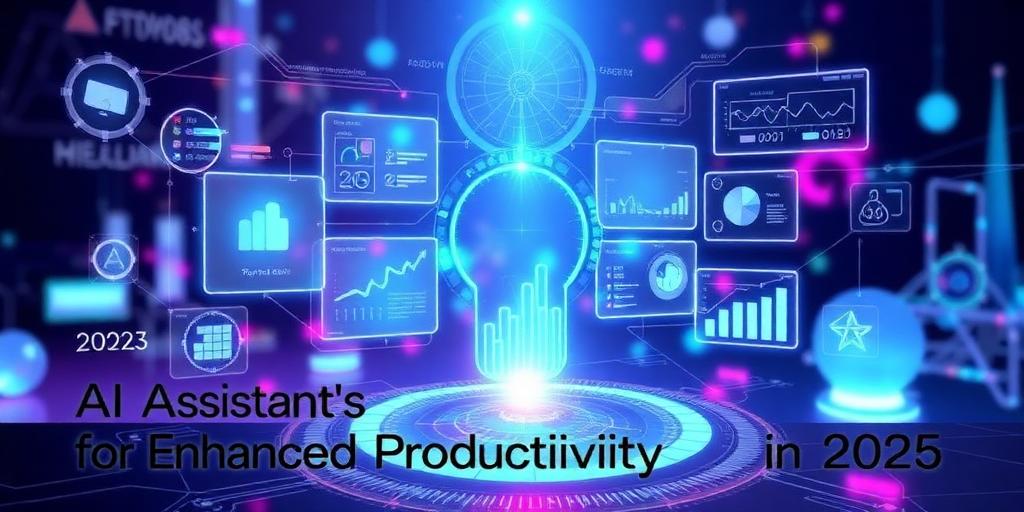AI Assistants for Enhanced Productivity in 2025
As we approach 2025, Artificial Intelligence (AI) is no longer a futuristic concept but a present-day reality transforming numerous aspects of our lives. One of the most impactful applications of AI lies in its ability to enhance productivity through AI assistants. These digital tools are becoming increasingly sophisticated, offering a range of features designed to streamline workflows, automate tasks, and improve decision-making.
Current State of AI Assistants
AI assistants have evolved significantly over the past few years. Initially, they were primarily used for simple tasks such as setting reminders, answering basic questions, and managing schedules. Today, AI assistants can handle more complex functions, including:
- Data Analysis: Processing large datasets to identify trends and insights.
- Content Creation: Generating reports, articles, and marketing materials.
- Project Management: Tracking progress, assigning tasks, and optimizing workflows.
- Customer Service: Providing instant support and resolving issues.
These advancements are powered by developments in natural language processing (NLP), machine learning (ML), and deep learning (DL). As these technologies continue to improve, the capabilities of AI assistants will expand even further.
Key Benefits of AI Assistants
- Increased Efficiency: AI assistants automate repetitive tasks, freeing up human employees to focus on more strategic and creative work. For example, AI can handle data entry, email filtering, and appointment scheduling, reducing the administrative burden on staff.
- Improved Accuracy: AI algorithms are designed to minimize errors and ensure consistent results. This is particularly valuable in tasks that require precision, such as financial analysis and quality control.
- Enhanced Decision-Making: By analyzing large datasets and providing real-time insights, AI assistants help decision-makers make more informed choices. AI can identify patterns and correlations that might be missed by human analysts, leading to better outcomes.
- 24/7 Availability: Unlike human employees, AI assistants can operate around the clock, providing continuous support and monitoring. This is especially beneficial for businesses with global operations or those that require constant uptime.
Predictions for AI Assistants in 2025
Looking ahead to 2025, we can expect AI assistants to become even more integrated into our daily routines. Several key trends are likely to shape their development:
- Hyper-Personalization: AI assistants will become more adept at understanding individual preferences and tailoring their responses accordingly. This will involve analyzing user behavior, learning from past interactions, and adapting to specific needs.
- Advanced Collaboration: AI assistants will facilitate seamless collaboration between team members, regardless of their location. They will be able to coordinate schedules, share information, and manage project workflows more effectively.
- Proactive Assistance: Instead of simply responding to requests, AI assistants will anticipate user needs and offer proactive assistance. For example, an AI assistant might remind a user about an upcoming deadline or suggest relevant resources based on their current task.
- Integration with IoT Devices: AI assistants will increasingly interact with Internet of Things (IoT) devices, enabling users to control their environment and automate tasks through voice commands or mobile apps. This could include adjusting lighting, temperature, and security systems.
Challenges and Considerations
While the potential benefits of AI assistants are significant, there are also several challenges and considerations to keep in mind:
- Data Privacy and Security: AI assistants rely on vast amounts of data to function effectively. It is crucial to ensure that this data is protected from unauthorized access and misuse.
- Ethical Concerns: As AI assistants become more autonomous, it is important to address ethical issues such as bias, fairness, and transparency. AI algorithms should be designed to avoid perpetuating discriminatory practices or making decisions that could harm individuals.
- Job Displacement: The automation of tasks by AI assistants could lead to job displacement in certain industries. It is important to prepare for this shift by investing in education and training programs that help workers develop new skills.
- Dependence on Technology: Over-reliance on AI assistants could reduce human critical thinking and problem-solving abilities. It is important to strike a balance between leveraging AI and maintaining human expertise.
Conclusion
AI assistants are poised to play a pivotal role in enhancing productivity in 2025. By automating tasks, improving accuracy, and providing real-time insights, these digital tools can help individuals and organizations achieve their goals more efficiently. However, it is important to address the challenges and considerations associated with AI, such as data privacy, ethical concerns, and job displacement. By doing so, we can harness the full potential of AI assistants while mitigating potential risks.
